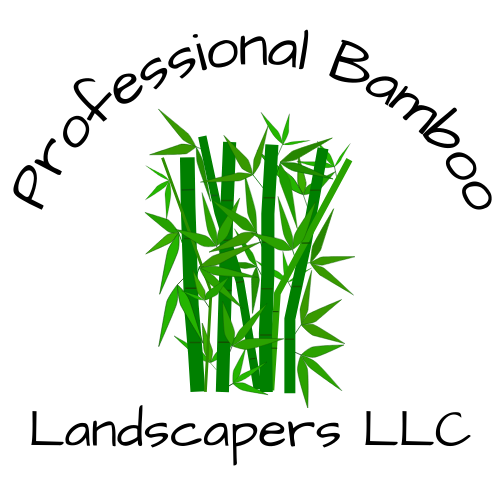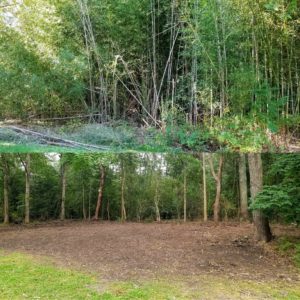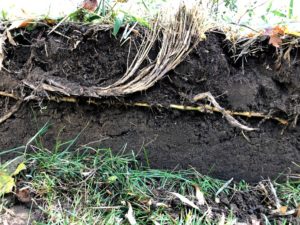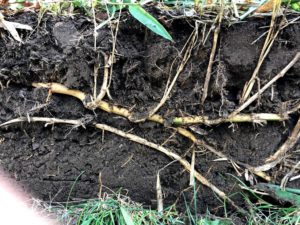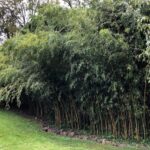You may have planted running bamboo because it looked great in the yard, but you may not have known how destructive it is. Or maybe you were misled by a landscaper who was not aware of the way it grows. Maybe your neighbor planted bamboo and now it is invading your property, now you wish to know how to kill bamboo.
Let us begin with the mowing method. This will require you to cut the grove to the ground which is hard work within itself. Then you will set a mower to the lowest bracket setting and mow the area as frequently as you mow your lawn. Larger mature groves produce very hardy, thick, woody culms that will destroy a mower as it will be like mowing over rocks. We have had many clients use this method for years before calling us, one client used this method for 10 years! The bamboo kept spreading and they eventually called the professionals to end this problem for them.
You can also attempt the black tarp/plastic method. This method again requires you to cut the grove to the ground and then cover with black tarps or plastic. The idea here that the sun will heat the plastic and essentially cook the rhizomes under the surface. The trouble here is that the soil can act as an insulator, and the soil itself cannot dry out. This method is thus not effective. The rhizomes are watered and healthy and will also pierce through the tarp/plastic covering. In my experience, I have only seen this method work in newly planted groves of 2 years or less. We often find these coverings during our excavations. I have personally seen them flapping in the top of the canopies of the grove.
Another method you can try is also very labor intensive, you will cut the grove down to the ground and then proceed to dig a deep trench around the grove. This idea is to isolate the grove, keep it cut down and starve it off. The obvious issue is how physically strenuous this is and not feasible for many people. In addition, all the innumerable rhizomes stretching far and wide from the grove are still alive and will begin to sprout.
There is this idea that you could or should use poisons to kill bamboo. I am here to tell you that this a terrible idea. While more non-toxic chemicals like vinegar and/or salts just simply will not kill the rhizomes. I have seen suggestions on pouring gas or diesel over the areas of the property that are affected by running bamboo rhizomes. This is illegal, and very harmful to the environment as it poisons ground water and spreads essentially harming nature while not killing the bamboo rhizomes.
Another chemical solution you may read about online is Roundup also known generically as glyphosate. Glyphosate needs to be applied to the leaves of unwanted plants. This chemical is then transported through the xylem and phloem of the unwanted weeds to kill the roots. This works on smaller plants and trees. Bamboo grows to 35 feet tall; you will need a very tall ladder to reach those leaves. Spraying glyphosate indiscriminately over large areas is irresponsible, completely ineffective, and a hazard to children, neighbors, pets, and other animals etc. Cutting a culm and pouring glyphosate in the now cut culm stump does not harm the rhizomes. The culm is dead once it is cut, the bamboo’s phloem and xylem will not transport the chemical to the rhizome system. Not to mention glyphosate has been linked to cancer.
If you have tried any chemical remedies to kill the bamboo in your property, please be courteous to us and inform us so that we can take proper precautions to protect ourselves from the hazardous chemicals.
Keep in mind that if you were to affectively kill a few rhizomes, there are thousands of others. Now you can begin to see why you need to call a professional to solve a destructive bamboo problem. We are the leading experts in our field and have successfully performed hundreds of successful removals.
There are only two affective means to kill or control bamboo.
Excavation: Our team has many years of experience excavating bamboo rhizomes from properties all over New Jersey. Our operators are skilled at identifying the path of rhizomes and following them to their ends. Excavation is the only method that will successfully remove the extensive rhizomes from the soil ensuring a quick end to the problem. All soil is left behind which means no soil will need to be brought in the regrade the property.
Containment: If it is your wish to keep some of the grove intact but wish to control it, or if the bamboo is entering your property from a neighbor, we can contain the bamboo. To do this we use our trusted HDPE Rhizome barrier. We will first remove all the rhizomes from the unwanted areas of the property. Then we will dig a trench around the grove or along the perimeter of the property and install our high-density polyethylene rhizome barrier along the trench. The trench will backfilled and raked.
Please call us at Professional Bamboo Landscapers LLC if you have any questions or concerns regarding bamboo.


